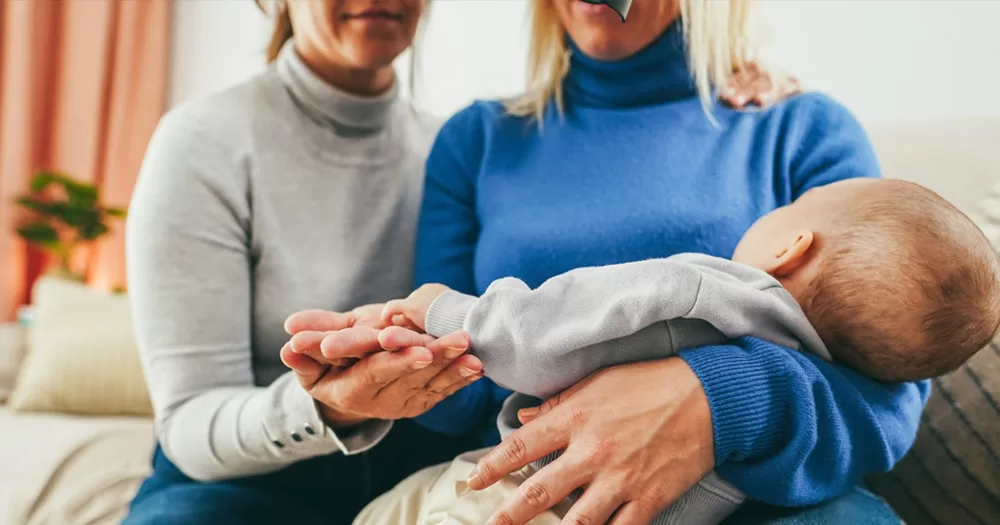The European Parliament held a vote yesterday, December 14, to express its support for the recognition of parenthood, including of same-sex parents, throughout the EU in the form of the European Certificate of Parenthood. The Parliament voted in favour of recognising parenthood regardless of how a child is conceived, born, or based on the type of family structure the child has–including children with LGBTQ+ parents.
The motion, which passed with 366 votes in favour, 145 votes against, and 23 abstentions, would recognise the parenthood of same-sex parents throughout the EU, regardless of the policies of individual countries, so long as parenthood is established in a country that recognises the legitimacy of LGBTQ+ parenthood. The European Certificate of Parenthood will similarly offer all EU minors the same rights provided for by national laws on education, healthcare, custody and succession.
According to provisional texts approved by Members of the European Parliament (MEPs), EU member countries will still be able to legislate within their own states as to whether or not to accept applications for parenthood certificates in specific situations, such as surrogacy, but after a parenthood certificate is approved in one EU member country, all member states will be required to recognise it.
These texts similarly stated that EU member states would only be able to deny a parenthood certificate if it is “manifestly incompatible with public order” and only in well-defined cases. In order to eliminate biases and discrimination, particularly in the case of same-sex parents, the EU Parliament is calling on member states to approach parenthood certificates on a case-by-case basis.
While the European Certificate of Parenthood will not replace national documents, its intent is to reduce bureaucracy and facilitate the recognition of parenthood throughout the EU. The certificate will be available for EU citizens to access online and will be available in all recognised EU languages.
Following the successful vote, MEP Maria-Manuel Leitão-Marques (S&D, Portugal), said: “No child should be discriminated against because of who they belong to or how they were born. Currently, children can legally lose their parents when they enter another Member State. This is unacceptable. With this vote, we are getting closer to the goal of ensuring that if you are a parent in one Member State, you are a parent in all Member States.”
While the vote passed successfully at the EU Parliament, the motion’s approval will now turn to EU governments, who must vote unanimously on the final version of the proposed legislation. The legislation will affect more than two million children who may currently be in a situation wherein their parents are not recognised as such in a number of EU member states.
The latest update on the European Certificate of Parenthood comes after the EU parliament called for similar cross-border recognition of adoptions in 2017. Yesterday’s vote aims to fill existing gaps in parental recognition throughout the EU to ensure that minors can enjoy the same rights in every member state.
The motion faced backlash in some more conservative EU countries, including Italy, where anti-abortion and anti-LGBTQ+ groups voiced their opposition to the changes. However, Italian MEP Sabrina Pignedoli, spoke in support of the motion, telling Repubblica: “This provision is necessary to safeguard the fundamental rights of minors regardless of the sexual orientation of their parents and regardless of how they were born.”
“Anyone who is a father or mother in one Member State will in fact be automatically recognized in all other Member States and will therefore be able to move freely with their children throughout Europe. Today, unfortunately, this is not the case in Hungary, Poland or Bulgaria, countries that do not recognize parenthood established in another state in the cases of LGBT parents,” Pignedoli continued. “Even in Italy, as is known, there is strong discrimination and the judicial authority often has to intervene to re-establish the rights recognized abroad”.
Speaking on the EU Parliament’s decision to move forward with the European Certificate of Parenthood, Irish MEP Maria Walsh wrote: “It’s a hard one to fathom, that in 2023, blended families – those who adopt, those who go through altruistic surrogacy, and our rainbow families – still have little or no protection nationally. The European Certificate of Parenthood will clarify the rights as a parent and family across the EU, while ensuring that children do not lose the protection of their parents. Our children deserve this protection.
“It will approve and recognise surrogacy arrangements, and the parent or parents who have cared for and nurtured their children, yet have not been legally recognised as parents, will finally be recognised as such.
“The European Certificate of Parenthood will be another important step forward for equality, but we need to recognise national legislation, and this EU Certificate must also recognise LGBTI+ families. After today’s vote in Parliament, the final decision on the legislation will lie with Member States, as family law falls under national powers. Today, I am pleading with the Irish Government, and indeed with all Member States, to ensure all of our national laws and policy reflects and supports all families, and not just some,” concluded MEP Walsh.
© 2023 GCN (Gay Community News). All rights reserved.
Support GCN
GCN is a free, vital resource for Ireland’s LGBTQ+ community since 1988.
GCN is a trading name of National LGBT Federation CLG, a registered charity - Charity Number: 20034580.
GCN relies on the generous support of the community and allies to sustain the crucial work that we do. Producing GCN is costly, and, in an industry which has been hugely impacted by rising costs, we need your support to help sustain and grow this vital resource.
Supporting GCN for as little as €1.99 per month will help us continue our work as Ireland’s free, independent LGBTQ+ media.

comments. Please sign in to comment.